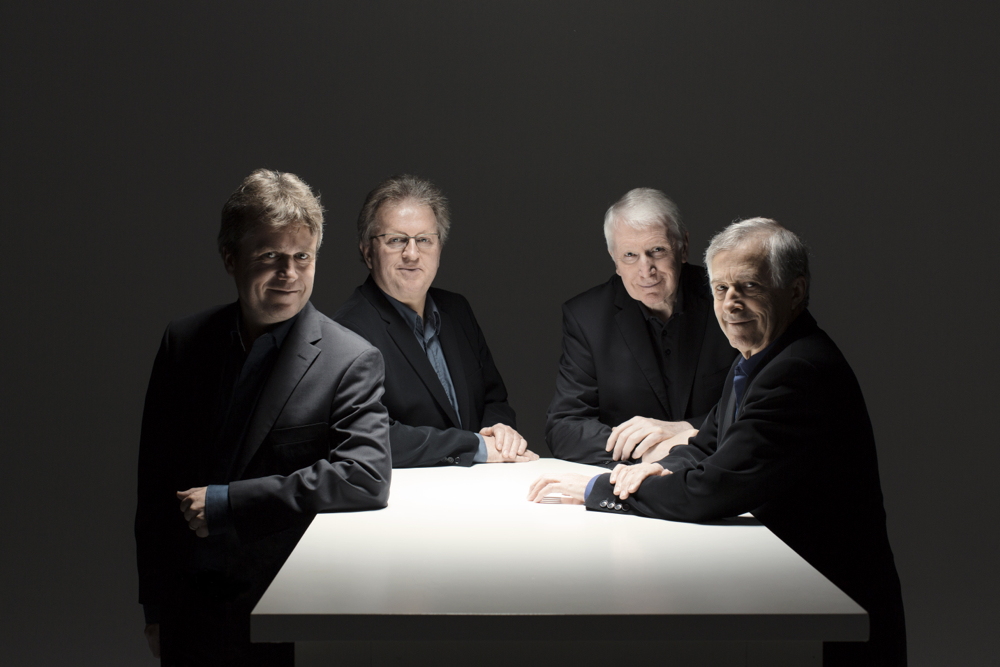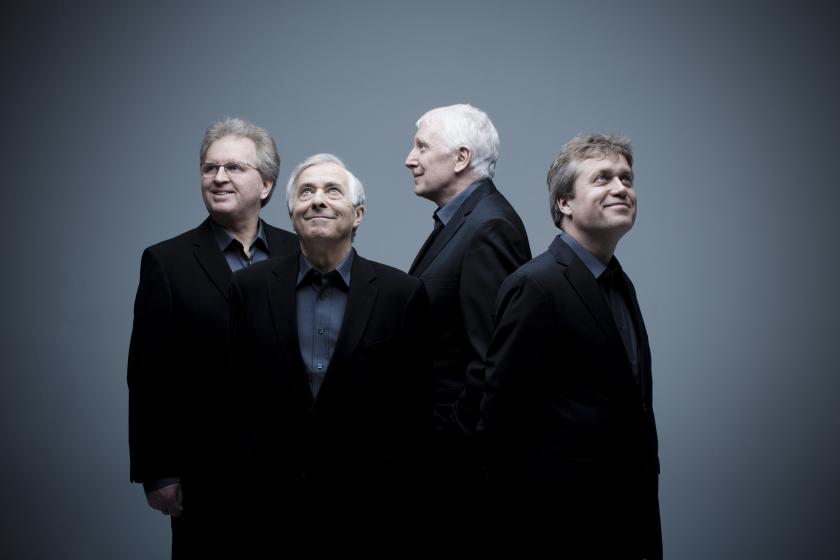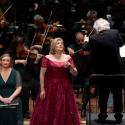The sophisticated and exquisitely crafted sound of The Hilliard Ensemble has, over the past four decades, become one of the most distinctive pleasures on the choral scene. One of the several pioneers of the medieval and Renaissance repertoire to emerge in the Seventies, The Hilliards have, nonetheless, made this music their own, their glistening sound offering a more contemporary aesthetic than that of historically-specialist period performances. Named after Elizabethan miniaturist Nicholas Hilliard, they share that portraitist’s delicacy, urbanity and intense colouring. Today, they have a historical and generic range few ensembles can match. They now perform as much contemporary as historical repertoire, and specialise (if such a term applies to a group whose eclecticism is a defining features) in singing a cappella in the most rewarding and responsive acoustic spaces.
Estonian composer Arvo Pärt is a favourite, as is the 16th-century aristocratic Neopolitan uxoricide Carlo Gesualdo; the earliest complete mass setting by 14th-century French composer Guillaume Machaut, whose poetry was read by Chaucer, sits in their catalogue alongside works by the avant-garde German Heiner Goebbels, whose meditation on age and death, “I Went to the House, but Did not Enter”, a setting of texts by TS Eliot, Maurice Blanchot, Kafka and Samuel Beckett, bears a fascinating thematic and sonic contrast with the historical religious repertoire.
We often find a lot of religious music is written for a large acoustic, and is less wordy, which suits us perfectly
Nor is this variety purely coincidental: they have more often been drawing thematic connections across many centuries. The album Il Cor Tristo, for example, featured settings of Dante and Petrarch by Renaissance composers Bernardo Pisano and Jacques Arcadelt next to passages from Dante set by contemporary British composer Roger Marsh.
Outside the cloistered world of period performance, they are undoubtedly best known for their collaborations with the Norwegian saxophonist Jan Garbarek: Officium (1994), Mnemosyne (1999) and Officium Novum (2010). The all-embracing spirituality of the sound, part medieval and part contemporary, and the use of Garbarek’s saxophone almost as another voice, which then breaks free from the singers to soar or plunge, broke new ground musically, and appealed to a huge audience (the trilogy has sold several million copies) far beyond the traditional early (or contemporary) music market.
For their first 15 years, the line-up was fluid; since 1990, countertenor David James, tenor Rogers Covey-Crump, and baritone Gordon Jones have sung together, with tenor Steven Harrold joining in 1998 when John Potter left. Though they have also recorded for Virgin and classical specialists like Harmonia Mundi and Hyperion, the Hilliards are most closely associated with the German label ECM, which is responsible for approximately half of their (very prolific) CD releases. The label’s founder, producer Manfred Eicher, was responsible for introducing them to Jan Garbarek, and The Hilliards have, perhaps, a quintessentially ECM sound: clean, contemporary, and genre-blending.
 I spoke to all four of the Hilliards in March, shortly before they left for the Scottish leg of their recent tour. They spoke a little like they perform, avidly completing one another’s phrases, and contributed roughly equally to the conversation. It would have been impossible to separate each individual’s contribution, so in keeping with the spirit of the ensemble, I have presented their response as a single answer.
I spoke to all four of the Hilliards in March, shortly before they left for the Scottish leg of their recent tour. They spoke a little like they perform, avidly completing one another’s phrases, and contributed roughly equally to the conversation. It would have been impossible to separate each individual’s contribution, so in keeping with the spirit of the ensemble, I have presented their response as a single answer.
MATTHEW WRIGHT: Critics often say you have a distinctive sound, a sophisticated, layered ECM sound?
THE HILLIARD ENSEMBLE: That’s essentially just how it emerges. With David’s voice, in particular, on top, that gives us a very distinctive sound. We never talk about it: it emerges organically. People assume that when we first started, we must have sat down and had a big pow-wow to discuss what sort of music we would be making. It’s never been like that. Of course, we discuss clarity, tuning, texture, how a line gets through; but the singing is something we do automatically.
How do you look for projects? Do you have a researcher? Is the scholarly aspect of the work - premieres of work that may not have been heard for centuries - of interest as well as the sound?
Gordon has done a lot of that. Early on, Paul Hillier did the programming, when this music wasn’t so common, and he went to lots of concerts, always listening for things we could do. John Potter brought a lot of music along, and there are certain things we’ve liked, but there’s no one way. Other collaborations come our way, they come to us, to an extent. Sometimes a festival will suggest a piece that suits us, and fits into a programme. Occasionally a festival has its own local composer. There was a manuscript from an obscure town in Germany, featuring one particular composer, which we had to perform once. But historical programmes can be rather dull. It’s much more important to engage in the imagination. There’s always new music to record from looking into more obscure composers. We have friends who are academics, and they’ve suggested, for example, the English composer Walter Frye. People have got used to a different kind of programming: most of the audience have never heard of most of our composers.
The field of early music and period performance has exploded in the last 40 years, partly as a result of what you’ve done. Where do you stand on the debate about period performance? Is it an issue for singers in the way it is for instrumentalists? How do you approach recreating period effects?
We don’t consciously go out of our way to use a period technique. We sing music which we think works. In general a straighter sound does justice to early music better: it resonates better. Those period facets help, but it’s not something we discuss at great length. There’s very little evidence of how that music was performed. It’s much more interesting to be performing in as fresh a way as possible rather than spend 40 years slavishly following a style.
There’s a gap of several centuries between your latest “early” work (Bach) and your earliest contemporary. Why do leave out such a rich period? Is it about promoting lesser-known composers? Something aesthetic?
In the early days, the Hilliard Ensemble used to sing 19th-century glee-type madrigals. Paul HIllier had a fascination with them. For our first ten years, we used to sing Romantic part songs, but those days have passed. We look for things that suit our voices best. It’s purely a question of what suits your voices. Then, with 18th- and 19th-century repertoire, you often need an accompaniment, and a soprano, which makes it harder for us.
We can choose the key for an a capella piece, too; we’re not restricted, as long as it sounds good. In most cases we have no idea what pitch early music was performed at. Palestrina was sung at much too high a pitch; in Rome it was a minor third lower. As a boy, I always remember wondering, why is Palestrina so high? Historically performed Palestrina can be monochrome; we want a technicolour, extrovert performance.
One of the connections between medieval and Renaissance repertoire and modern composers like Pärt and Macmillan is their faith? Is that important to you? Does it affect the music in any way, do you think?
It’s not like being an actor, having to inhabit the role. But we’ve all grown up in the church. John Potter used to say, take from it what you want to take from it. The listener will take what they want to take from our music. We often find a lot of religious music is written for a large acoustic, and is less wordy, which suits us perfectly.
We are fortunate ECM has such a distinctive reputation. People trust Manfred
When you started collaborating with Jan Garbarek, what did you anticipate? Did you have any idea it would grow as much as it has? Where did the idea for the project come from?
We were already recording for ECM, and Jan was one of their original recording artists. Manfred Eicher always encouraged collaborations, and he approached us, and suggested Garbarek. A meeting was arranged. Even when it was recorded, moving as it was, we had no idea how much it was going to catch on. It was extraordinary - a sound we’ve never heard before - uncanny. At the time people didn’t mix things like that, so it was innovative for the time.
It’s often said that Garbarek’s saxophone is sometimes like another voice, blending in with the quartet, and at others, able to soar away, beyond the voice in range and volume? How did it work to perform alongside him?
Jan’s control of colour variation, his acoustics, is fantastic, so sensitive. He can adapt, he’s a most creative guy. He can start playing from nothing, and create the most dramatic sound, and he can do it without a lot of vibrato. His harmonic sense is very sophisticated too, way beyond most.
I have a soft spot, if that’s the term, for Gesualdo’s music, which you’ve recorded several times. Some critics talk about the modern dissonance of his music; does he feel particularly modern to perform? Can you can tell anything about his character from the music? Is there such a thing as a murderer’s song?
The way he juxtaposes cadences with quick sequences of chords, that’s what’s distinctive. His individual chords are ordinary, but the effect is so distinctive, on the brink of opera. The speed with which he can change the mood is extraordinary. Nobody else could do it in the same shocking way. Emotions and life must influence one another, but it can’t be very black and white. His writing suggests he was on the edge most of the time.
Are you offended when some of this repertoire, especially, I guess, the Garbarek and Pärt pieces, are used as “spiritual” background music, a kind of sonic equivalent of the scented candle? One of the online streaming services I use classified Officium Novum as “easy listening”: that must be quite irritating?
It’s out of your hands, if people put it into new categories. We do a lot of music people don’t know how to categorise. People want you to fit into boxes: Heiner Goebbels, how do you define that? We’ve had major problems with communicating in certain countries where they had hard lines between musical categories. In France there’s great difficulty combining anything with jazz: they weren’t convinced... It can be a barrier to creativity, that sort of rigid approach. Mixing old and new is difficult for people in CD shops.
We are fortunate ECM has such a distinctive reputation, it’s an immense benefit. People trust Manfred. They won’t question it. They have bought our work because it’s on ECM. In Taipei we once spent an evening with the Taiwanese ECM society. People love the ECM style. Manfred’s influence is also important: he’s very hands-on. He can be infuriating. He has to really like the material. We have occasionally convinced him, but occasionally something has had to go.
How does singing change with age? On the one hand, you know each other better, you have more experience, which much make it easier; on the other, age must have some effect on the voice?
If you start as a high voice you get lower! The big thing is the way we communicate together. It’s not about being stand-out voices. Yes, experience is a large part of the success, you don’t have to push. That’s also an advantage of a capella: we can adapt, if one or two are not fully well, the others can adapt. That comes with experience. We know how to manufacture sound and fill in gaps.
Looking back, is there a favourite moment/disc/performance? What are you most proud of?
The orchestra guides us harmonically. A capella is wonderful because we have the freedom and flexibility to adapt. We’re the masters of our own destiny. If we’re doing a piece with orchestra, we can’t change.
We’re most proud of the obvious ones: Garbarek, and Heiner Goebbels, all those things that seem difficult for non-musical reasons. The very first page of the Lassus requiem requires fantastic tuning. Our collaboration with Arvo Pärt has been a highlight, and also working with the New York Philharmonic at the Lincoln Centre with Lorin Maazel. That was a situation we hadn’t imagined.
James MacMillan decided to incorporate us into a BBC commission, Quickening, for 100-piece orchestra. MacMillan loves percussion, the section is huge, and you have to sing in a more solistic way to stand out, but there were moments when we were singing a capella. The highlights are often when we asked to do something, and we’re not sure if it will work, because it’s outside the norm.
- The Hilliard Ensemble performs at the Cambridge Early Music Festival on 2 May, and with Jan Garbarek at the Cheltenham Music Festival on 11 July














Add comment